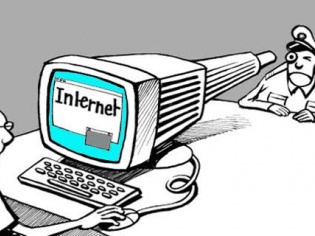-
Team TechTree
11:40 07th Nov, 2019
Are You on Social Media? Be Ready for Surveillance | TechTree.com
Are You on Social Media? Be Ready for Surveillance
What began as a platform for social interaction between individuals and groups is fast becoming a tool for surveillance and manipulation, says a new study

Over the past few weeks, there has been an outcry over alleged snooping of social media handles and platforms with most top technology majors including Facebook and Google facing legal action over third-party surveillance. Now, a new report claims that nearly 90% all internet users could be on the list of people monitored by bad faith actors.
A new report by Freedom on the Net 2019 prepared by independent watchdog organization Freedom House suggests that as much as 89% of internet users or three billion people fall under some sort of surveillance program. The report ranked China as the least free country with Russia and Egypt also rated as “not free”.
Of the 65 countries assessed by more than 70 analysts who contributed to this year’s edition of the report, 33 have been on an overall decline since June 2018 as against 16 that registered net improvements. The researchers used a 21-question data collection methodology that addresses internet access, freedom of expression and privacy issues.
Besides ranking countries by their internet freedom score, the project also identified global trends related to the impact of information and communication technologies on democracy. Country-specific data providing details of this year (June 2018 to May 2019) has been listed out at the company’s website that can be accessed at freedomonthenet.org.
The report on India, which has left out Kashmir, from the analysis, suggests that internet freedom declined in the country resulting in an increase in arrests for online activity and continued internet shutdowns during times of perceived unrest.
“Plagued by the spread of disinformation and its violent effects offline, the government proposed worrisome new rules that would undermine freedom online. Data protection and surveillance issues remained of key concern to Indians during the coverage period; controversies also continued around Aadhaar, the world’s largest biometric identification system, and a problematic draft data protection bill remained in limbo,” the India-specific report says.
The report further points to the 2019 general elections suggesting that incumbents and candidates alike “manipulated content, used bots and employed volunteers to push inorganic content and exacerbate existing social tensions for political gain,” which caused online harassment and trolling of marginalized groups in particular.
In the section on obstacles to change, the report said that while governments do not routinely block the protocols or tools that allow for instant, person-to-person communication, the fact remains that India is a global leader in the number of internet shutdowns imposed, according to a report published by IFEX.org.
The report further said that local authorities around India have restricted ICT connectivity and usage during times of perceived unrest since at least 2010. The frequency, geographic distribution, and duration of these shutdowns have increased significantly in the past five years
“Shutdowns were implemented in at least 14 states in 2018, and 7 states had seen internet shutdowns in 2019 at the time of writing, with government officials typically justifying them as cautionary measures to maintain law and order, quell violence, prevent cheating on exams, restrict protests, or prevent the spread of disinformation; they affected both mobile and fixed-line connections,50 and lasted anywhere from a few hours to a few days,” the report said.
At the other end of the spectrum is Iceland which was ranked as the world’s best protector of internet freedom, having registered no civil or criminal cases against users for online expression during the coverage period. “The country boasts enviable conditions, including near-universal connectivity, limited restrictions on content and strong protections for user rights.”
A report in Firstpost.com quotes a research report by Sensor Tower that post the outbreak of NSO spying scandal via WhatsApp, the downloads of the app has fallen by a whopping 80%, signalling that India is wary of surveillance.
Unfortunately, there is little that individuals or groups can do with surveillance, which is considered by governments as a necessary tool in the fight against organized crime. Of course, what happens when governments go rogue is something that needs to be considered.
TAGS: Facebook, Twitter, instagram, Spyware, Snooping, data snooping, Surveillance, NSO
- DRIFE Begins Operations in Namma Bengaluru
- Sevenaire launches ‘NEPTUNE’ – 24W Portable Speaker with RGB LED Lights
- Inbase launches ‘Urban Q1 Pro’ TWS Earbuds with Smart Touch control in India
- Airtel announces Rs 6000 cashback on purchase of smartphones from leading brands
- 78% of Indians are saving to spend during the festive season and 72% will splurge on gadgets & electronics
- 5 Tips For Buying A TV This Festive Season
- Facebook launches its largest creator education program in India
- 5 educational tech toys for young and aspiring engineers
- Mid-range smartphones emerge as customer favourites this festive season, reveals Amazon survey
- COLORFUL Launches Onebot M24A1 AIO PC for Professionals







TECHTREE